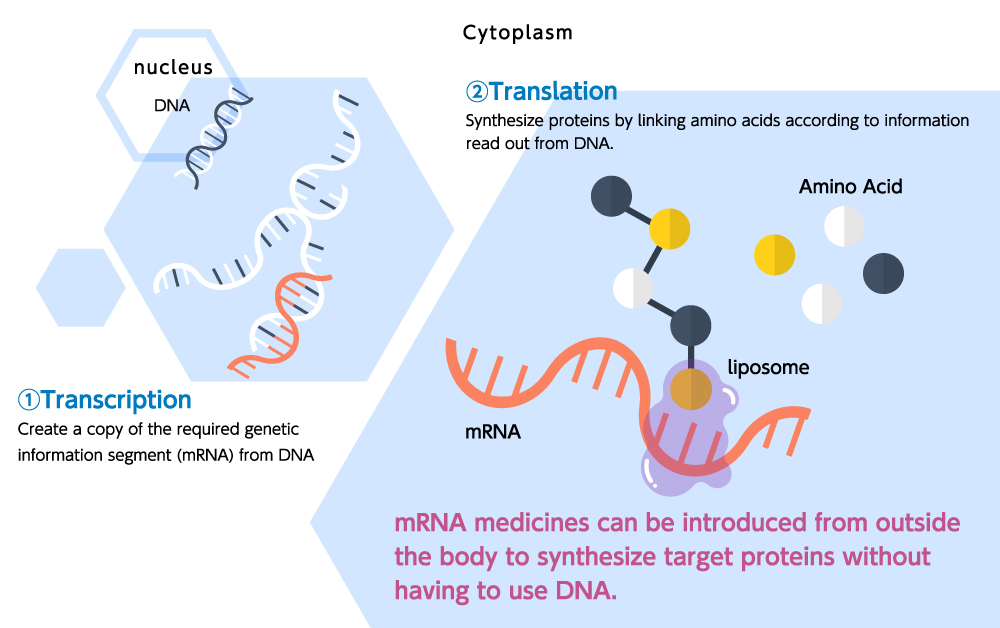mRNA medicine
In the race to develop a vaccine against SARS-CoV-2 (COVID-19), which suddenly emerged in 2019, mRNA vaccines, a new drug discovery modality, were quickly approved, immediately bringing messenger RNA (mRNA) medicine to the public’s attention. Despite the special circumstances of a pandemic, mRNA vaccines were put into practice within a year of the identification of the virus, and their benefits, such as efficacy and safety, were demonstrated. In the future, mRNA medicine is expected to change the world of drug development by creating new medicines.
1.mRNA medicine
The genetic information of all living organisms is stored in DNA. The set of DNA molecules (called the “genome”) contained in all the cells that make up an individual is essentially the same, but each cell produces the proteins necessary to maintain and express its function, resulting in the various differentiated cells that make up that individual. mRNA is essential for the production of proteins from DNA.
Figure 1: Mechanism of protein production from genetic information stored in DNA in the cell nucleus

- Transcription: The corresponding mRNA is synthesized as a molecule that copies the information from the required DNA region. This process is called transcription.
- Translation: Transcribed mRNA undergoes various modifications and travels from the nucleus to the cytoplasm, where it is transported to the ribosome, the site of protein synthesis. There, amino acids are linked according to the information in each mRNA, and each protein is synthesized. This process is called translation. The synthesized protein undergoes various post-translational modifications and is three-dimensionally folded to act as a functional protein.
Concept of mRNA medicine
Introducing specific mRNA as a drug from outside the body allows the body to artificially produce the desired protein that compensates for the impaired function.
2.Superiority of mRNA medicines
- broad range of applications:
In principle, any protein can serve as a target molecule for mRNA medicine since mRNA can be designed for any protein as long as the sequence is known. This is a significant advantage over small molecule drugs that target enzymes or receptors or antibody drugs that target membranes or secreted proteins. - no risk of genomic insertion:
In the case of gene therapy, which mainly uses viral vectors, there is a potential risk that the externally introduced DNA will be incorporated into the genome and cause cellular oncogenic transformations, etc. However, in the case of mRNA medicines, there is no such concern. - Longer-lasting drug effect compared to protein transduction:
This is a significant advantage for “substituting the protein replacement therapy for hereditary rare diseases,” which is one of the eagerly expected applications. - Easy to design in a short time if the sequence is known:
The research and development of the COVID-19 vaccine during this pandemic is the best example of the strength of mRNA medicine. The speed of development was unprecedented for a conventional vaccine, since it took less than two months from determining the virus sequence to starting the clinical trials. This feature will prove highly advantageous in the future, not only for addressing pandemic situations but also for providing practical treatment therapies for patients suffering from diseases.
3.mRNA medicine can be applied to various diseases
vaccination
Infection disease prevention vaccine
COVID19、Influenza、CMV、RSV、Zika、Deng etc.
Cancer vaccine
Shared Antigen or Neo antigen
immune tolerance vaccine
Various allergic diseases (food, pollen, MS, etc.)
Local Tissue Regenerative Medicine
VEGF-A、IGF-1、BMP-2、HNF4A、BDNF、RUNX1 etc.(growth factors, transcription factors, etc.)
Genetic Disease/Rare Disease
Replacement therapy for oxygen deficiency (alternative to gene therapy)
